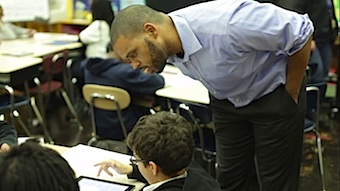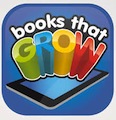Can Technology Help with Group Reading?
Daniel Fountenberry is a former teacher, an education entrepreneur and founder of Borne Digital. His latest creation, Books That Grow, is a platform that individualizes reading materials for middle school students. It’s a Tools of Change startup showcase winner, a finalist at SXSW Edu, and was featured in a CNN story this week. Books That Grow is currently running a Kickstarter campaign to expand its library tenfold.
By Daniel Fountenberry
My biggest AHA moment about the potential of adaptive reading technology came in a middle school classroom in New York City, as I was watching the students go about their reading assignments. I was slowly getting to know them during my regular visits after lunch on Tuesdays, so I realized that what I was witnessing was pretty unusual.

Ellen, their teacher, looked at me approvingly across the room. She and her students were helping me test a reading platform that I’d been working on for a while and had named Books That Grow. And we were already seeing a difference.
The group-reading dilemma
Before I started building education technology, I wore many hats – a reporter, a product developer, a chief of staff, a business student. But the most important episode in my career was the one that sparked it all – I was a teacher.
If I had to name one thing that I took away from my years as an educator, it would be the sheer amount of work I had to put in to have a group of students read together. Just like the kids in Ellen’s classroom, my students had vastly different reading abilities. Some were very talented, fast readers and curious learners, while others had a hard time keeping up, often coming from families that owned few books or had just recently come to the US and spoke a different language at home. I was struggling to push all of my students to reach their maximum potential, and, as in so many classrooms, a lot of learning fell through the cracks when class periods ran out of time.
Throughout my numerous endeavors I always kept an eye on K12 education. I regularly spoke to teachers and knew that many were splitting their students into ability groups and assigning different reading materials. This was a lot of work: preparing and running several lessons simultaneously isn’t easy! Besides, kids would quickly figure out which group had the “slow” readers and mocking ensued.

Building a better book
I brought together a team of educators, technologists, and writers who all worked tirelessly to build a platform that we decided to call Books That Grow.
There were so many questions that had to be answered: How do you determine what distinguishes a fifth grade level text from, let’s say, seventh grade? How do you measure performance? How do you get the technology built and make sure it runs smoothly? What reading materials are students interested in? How do you align them to the Common Core?
We tried and failed, and tried again, asked for second opinions, and worked tirelessly on improving our platform. And then, finally, the pieces of the puzzle started coming together as I watched Chantelle, Keith, and their classmates – a group with varied needs and abilities – reading the ‘same’ story together on their iPads.
The core story was the same, but the sentence structure, vocabulary words, and syntax were slightly varied, depending on the student’s reading ability. The kids were answering quiz questions as they worked through the text, which allowed the platform to gain insight into individual reading abilities and adjust further paragraphs accordingly. Ellen had her own dashboard where she could track her students’ progress, and see their strengths and weaknesses in the form of colorful charts.
I initially anticipated that what I and my team had created would be most helpful to slower readers. But during my classroom trials, I was pleasantly surprised to see how excited the more advanced kids were. They were pushing ahead, sweating through the hard words they could barely pronounce, and stopping to think at the higher level questions tailored for them.
Technology is not a panacea, but it can help
I believe that what we have done with Books That Grow is at the forefront of education technology. The 21st century world is multidimensional, and technological capabilities are expanding. I don’t see why a teacher should strain himself or herself everyday trying to be a superhero, toiling long after school hours just to produce age appropriate reading materials for students of different abilities.
I do not mean to suggest that technology is a panacea. I am also aware that many teachers spend out of pocket for basic supplies, let alone fancy tech devices. But I do have a dream, and I believe that if we work hard enough to introduce ideas like this and make them work well, that dream will become a reality. I hope that when my future children go to school, they have more productive and happier teachers – teachers who can focus on teaching, and let technology take part of the workload.
I’d love to hear your ideas about our concept and to answer any questions you have here. Let’s have a conversation.































I love the sound of this. One of the biggest time consumers for me as a teacher was creating different versions of texts for a single classroom. They call it “differentiation” and the department heads expected us to do this for every lesson, which was all but impossible to keep up with. But doing so IS important and in the best of worlds us teachers would do this for every lesson. This app actually sounds ideal. I also like how the creator doesn’t think its a panacea: being a former teacher he knows what’s up. Many programs taken on by schools are top-down from folks who never put one foot into a real classroom.
Hi Gregory. Thank you for your kind feedback. We created Books That Grow to empower teachers just like you. We agree that good teachers don’t need top down, scripted programs to teach. That takes all the fun and creativity out of teaching. Rather, we are creating tools to empower teachers. If you have any further questions, visit our website http://www.booksthatgrow.com and get in contact with us. We love talking to teachers.
This seems very ideal for us teachers. Finally a tool which will help struggled readers; this will improve their self confidence and improve in comprehension . Thank you!
Take a look at our growing library here: http://www.booksthatgrow.com/book-titles/. On this page you can also download our free teacher guides.